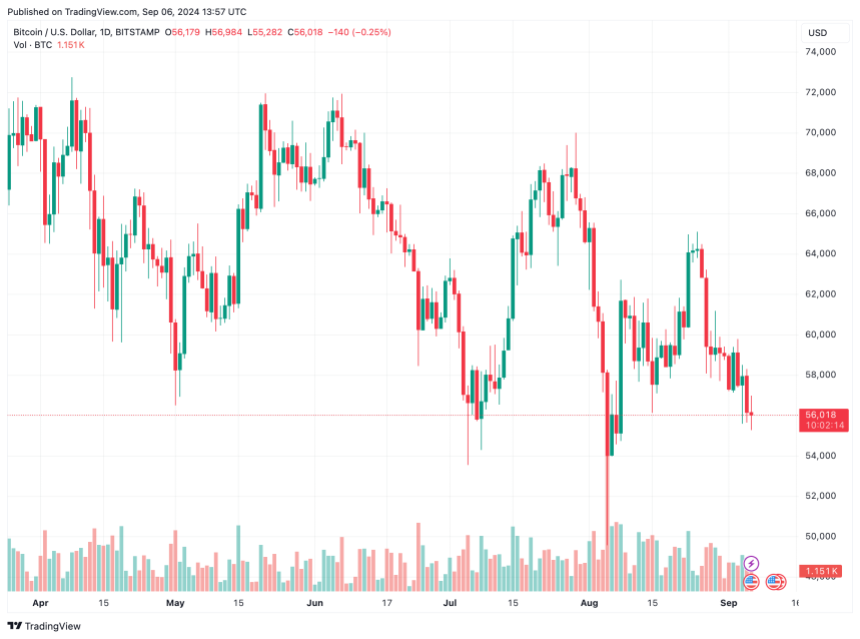Bitcoin 200-Day Average Signals Waning Bullish Momentum, Here’s What It Means For BTC Price
A key long-term price indicator for Bitcoin, the 200-day simple moving average (SMA) appears to be losing its bullish momentum as the US economy added fewer jobs in August 2024. Bitcoin Must Overcome The 200-Day SMA To Reverse Trend The 200-day SMA is considered one of the more reliable long-term indicators to gauge an asset’s upcoming price action. Bitcoin’s 200-day SMA shows a weakening bullish momentum, giving short-term traders little joy. Related Reading: Bitcoin Price Struggles: Can Bulls Step In to Save the Week? Notably, this is the first time since October 2023 that the 200-day SMA looks poised to enter bearish territory. Since late August, the daily increase in average price increases for BTC has not crossed $50, while it used to consistently record moves of more than $200 per day during the first half of 2024. At press time, the 200-day SMA stood at $63,840, about 13.96% higher than the current BTC price of $56,840. It’s worth highlighting that short-term moving average indicators such as the 50-day SMA and the 100-day SMA are already past their peak and have been trending downward. A bearish crossover was seen recently when the 100-day SMA fell below the 200-day SMA. According to cryptocurrency analyst Ali Martinez, the Stochastic relative-strength index (RSI) has signaled a trend reversal from bullish to bearish on the Bitcoin 2-month chart. If going by historical data, such a move has typically led to a significant correction of up to 75.50%. In addition, Google Trends shows that searches for the word “Bitcoin” have been at their lowest since October 2023, when BTC was hovering around $30,000. Adding to the overall bearish sentiment surrounding the leading digital asset, former CEO of BitMEX cryptocurrency exchange Arthur Hayes posted on X that he’s currently short Bitcoin and could see the crypto-asset crash to sub $50k level over the weekend. In contrast, other market experts opine that Bitcoin will likely bottom at $55,000 before the influx of US liquidity helps re-ignite the severely lacking buying pressure in the crypto markets. Bitcoin’s Fundamentals Remain Intact Although several crypto analysts seem to lean bearish on Bitcoin’s short-term price movements, the long-term bull case for the leading digital asset remains unchanged. Crypto analyst Crypto Jelle posits that Bitcoin’s tepid price action during the summer might reach its conclusion by early October before it could potentially resume another rally to the upside. Related Reading: Bitcoin Needs To Break $70,000 For The Uptrend To Continue, Here’s Why Institutional interest in Bitcoin also continues to rise, as Swiss banking giant ZKB recently rolled out Bitcoin (BTC) and Ethereum (ETH) trading and custody services for its customers. At press time, BTC trades at $56,018. Featured Image from Unsplash.com, Chart from TradingView.com

A key long-term price indicator for Bitcoin, the 200-day simple moving average (SMA) appears to be losing its bullish momentum as the US economy added fewer jobs in August 2024.
Bitcoin Must Overcome The 200-Day SMA To Reverse Trend
The 200-day SMA is considered one of the more reliable long-term indicators to gauge an asset’s upcoming price action. Bitcoin’s 200-day SMA shows a weakening bullish momentum, giving short-term traders little joy.
Notably, this is the first time since October 2023 that the 200-day SMA looks poised to enter bearish territory. Since late August, the daily increase in average price increases for BTC has not crossed $50, while it used to consistently record moves of more than $200 per day during the first half of 2024.
At press time, the 200-day SMA stood at $63,840, about 13.96% higher than the current BTC price of $56,840.
It’s worth highlighting that short-term moving average indicators such as the 50-day SMA and the 100-day SMA are already past their peak and have been trending downward. A bearish crossover was seen recently when the 100-day SMA fell below the 200-day SMA.
According to cryptocurrency analyst Ali Martinez, the Stochastic relative-strength index (RSI) has signaled a trend reversal from bullish to bearish on the Bitcoin 2-month chart. If going by historical data, such a move has typically led to a significant correction of up to 75.50%.
In addition, Google Trends shows that searches for the word “Bitcoin” have been at their lowest since October 2023, when BTC was hovering around $30,000.
Adding to the overall bearish sentiment surrounding the leading digital asset, former CEO of BitMEX cryptocurrency exchange Arthur Hayes posted on X that he’s currently short Bitcoin and could see the crypto-asset crash to sub $50k level over the weekend.
In contrast, other market experts opine that Bitcoin will likely bottom at $55,000 before the influx of US liquidity helps re-ignite the severely lacking buying pressure in the crypto markets.
Bitcoin’s Fundamentals Remain Intact
Although several crypto analysts seem to lean bearish on Bitcoin’s short-term price movements, the long-term bull case for the leading digital asset remains unchanged.
Crypto analyst Crypto Jelle posits that Bitcoin’s tepid price action during the summer might reach its conclusion by early October before it could potentially resume another rally to the upside.
Institutional interest in Bitcoin also continues to rise, as Swiss banking giant ZKB recently rolled out Bitcoin (BTC) and Ethereum (ETH) trading and custody services for its customers. At press time, BTC trades at $56,018.

What's Your Reaction?




















